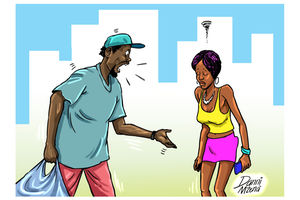Organisation gives new hope to the once hopeless Lifting HIV-positive people out of poverty

Today people living with HIV/Aids in Shinyanga are healthier and economically independent thanks to intervention by the Red Cross.
What you need to know:
Lawrencia Missana, a home-based care volunteer with TRCS in Shinyanga says they teach those living with HIV on the best ways to eat before taking ARVs.
For people living with HIV/Aids, it is recommended that they eat a nutritious diet. When it comes to meat, they are advised to eat white meat, found in chicken and fish, which is rich in protein.
Apart from the fact that their bodies need protein, white meat has less fat compared with red meat from cows and goats.
However, this is something that can only be easily said than done in Shinyanga, where the majority of the people, especially those in poverty stricken families are ignorant of what a balanced diet entails. Some can’t afford a balanced diet.
In Sukuma land, ugali with beans or makande, which is a mixture of maize and beans are the common food. Here, it is common for people to skip breakfast and eat only twice a day because they cannot afford three meals.
Because people living with HIV/Aids are required to eat a proper meal given their health status, the Tanzania Red Cross Society (TRCS), under its nutrition programme educates HIV positive people in Sinyanga, Kishapu, Geita, Bariadi and Kahama districts on the importance of so doing. It also empowers them to achieve that by imparting saving and entrepreneurship skills to them.
Teaching them how to fish
Lawrencia Missana, a home-based care volunteer with TRCS in Shinyanga says they teach those living with HIV on the best ways to eat before taking ARVs.
“There are people who knew how to before but economic hardships posed a challenge to some. Some people can’t afford three meals a day due to poverty,” Lawrencia says.
Rose Kafyome, 29, is a HIV positive single mother of a two-year-old child. She sells vegetables and is the sole breadwinner of her family of three. Apart from her daughter, Rose takes care of her elderly mother too.
In order for her to take her ARVs as recommended, Rose needs a minimum of Sh5,000 daily for her food alone. This does not include her daughter and mother. But she does not earn as much in a day from her vegetable business and therefore does not always afford a balanced diet. Rose is just an example of the many people in Shinyanga living with HIV, to whom a balanced diet is a challenge, yet vital.
To overcome this challenge, TRCS helped interested people living with HIV/Aids pool resources by forming a group that would see them out of poverty. Fifteen people joined forces and formed a savings and credit society namely Mshikamano.
Mshikamano group was established with the aim of empowering people living with HIV/Aids and orphans so as to raise their economic status. The members were taught how to save, borrow and start economic activities. Today Mshikamano group members are sure of eating a balanced diet thanks to the income generating projects they run.
“We were taught best practices under the programme including on proper nutrition so we can live longer. It was a good initiative because some of our members were already bedridden. Eating well and taking ARVs accordingly boosted our health,” says Francis Nyangindu, the group’s secretary.
Before they formed Mshikamano group, most of the members used to eat only ugali and makande. Their diets lacked vegetables, fruits, milk, eggs and fish as is required of a balanced diet. As a result, the ARVs they were taking made them weaker.
Francis says it was after numerous sensitisation sessions that his group members started changing their ways regarding nutrition. He says the challenge however, was the sustainability of income to buy the required food and cater for other family needs including health, water and education.
According to Nyangindu, before the introduction of Village Community Banks (Vicoba) targeting people living in hard conditions including those living with HIV/Aids, HIV positive people were stigmatised by people who believed they would die at anytime.
“They even declined to join us in Mshikamano Group,” recalls the group’s secretary.
Now that the health of the once sickly members have improved, those who used to stigmatise them now claim they are pretending to be HIV positive in order to attract support from NGOs and local authorities.
Using their Vicoba capital, Mshikamano members started a poultry project at Wila village and today they are proud owners of 75 chickens. Because they did not have a chicken coop, they distributed the chickens equally among them so that each member would keep the chickens in their own homes.
“We get eggs and white meat from the chickens. When challenges arise, we sell some and solve the matter at hand.”
With time, the group started keeping cows and with the help of Kishapu District Council, today Mshikamano owns nine cows. The group uses these cows to till land in the members’ farms. They also use manure produced in their farms.
The District council joined TRCS’ efforts by supporting Mshikamano so that the group may serve as an example to those who are yet to disclose their health statuses and end up in extreme poverty as a result. It did so as part of its efforts to alleviate extreme poverty in the district council.
“Each cow is worth not less than Sh650,000...now we can afford our meals and taking care of our family needs. Those who thought we were dying have changed their attitude towards us,” says Francis.
According to Lawrencia, Mshikamano members today have sustainable incomes and hence the purchasing power for their daily needs. No one is bed ridden but all the members are healthy and active. They all engage in income generating activities of some sort, from agriculture, poultry keeping to selling fruits and vegetables.
Mary Ojenda is a widow and a mother of six. She didn’t know the cause of her husband’s death in 2005 until she tested positive for HIV later on. Taking care of her children was an uphill task in the absence of her husband who was the family’s breadwinner.
After introduction of Vicoba in her locality two years ago, Mary was able to increase her food business capital after she saved enough money. In her Vicoba, they save Sh 3,000 a month which they keep in a secure box that serves as a safe. The members borrow money and pay with interest. This enabled Mary to swithc businesses from selling food at the Shinyanga town market to becoming a famous sardine trader in the town.
“Today I can order 20 bags of sardines from Mwanza and my capital now stands at Sh2 million. After gaining entrepreneurship skills under close supervision from TRCS, I’m experiencing transformation in my life,” says a proud Mary. She advises other people living with HIV/Aids to open up and join such groups for the betterment of their families and their health.
“The economic vacuum left by my late husband no longer exists,” she adds. According to her, her CD4 number has risen from 148 to 817, thanks to her ability to eat a balanced diet.
Lawrencia Missana, the TRCS volunteer says the economic empowerment groups have made her work of reminding the members to take their ARVs alongside proper nutrition easier. While they discuss about improving their income in those groups, Lawrencia uses the opportunity to sensitise them on nutrition and ARV adherence.
Apart from improving their income, the groups have helped the members stop self-stigmatisation as well as external stigmatisation because of their improved health while gaining confidence in the community.
According to the TRCS’ monitoring and evaluation officer in Shinyanga, Emmanuel Mughamba, Tanzania Red Cross Society aims at providing integrated and quality community-based HIV services to 89,693 people in 25 districts by this month (September) through trained community volunteers.
TRCS is also targeting to increase capacity of the district authorities in Shinyanga, Simiyu and Geita regions to provide home-based care services to people living with HIV while strengthening dual referral networks between households and health units. It also aims to reduce barriers in accessing antiretrovirals for people living with HIV.
Nutrition and entrepreneurship are other areas where TRCS is focusing by initiating groups of buying shares which in turn, have enabled people living with HIV to be independent.
Dr Sylvester Mrimi who works at Kishapu Health Centre says the facility has registered 2,070 people with HIV, thanks to TRCS’ intervention. He thanks TRCS’ initiative of empowering these people because they have changed positively and attend clinic frequently.
“I have worked here for almost nine years now. There is improvement. Now people living with HIV are well informed,” says Dr Mrimi.
Email: [email protected]


